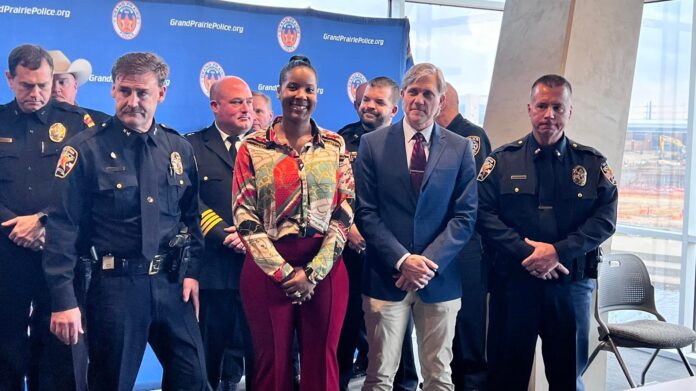Midlothian Police Department Awarded ICHANGE “Outstanding Unit Award”
MIDLOTHIAN – The Midlothian Police Department Crisis Intervention Unit (CIU) was recognized last week at the second annual ICHANGENATIONS Ceremony at the Grand Prairie Police Department. The department was awarded the ICHANGE “Outstanding Unit Award”.
“In years past the primary mantra of law enforcement was the “keepers of the peace,” Midlothian Police Chief Carl Smith said. “However, over the last 34 years I have seen incredible change within the policing profession. Modern policing is so much more than simply peace keepers, we have become problem solvers, mentors and collaborators with members of our community.”
Smith went on to say that indeed, mental health and mental illness is a root of many interactions with police officers today.
“Members of our community who suffer from depression, forms of PTSD, chemical imbalances or other disorders and conditions who are in distress must be approached by a multidiscipline team of professions who bring a variety of tools to effectively alleviate crisis and assist the individual receive treatment,” Smith added.
History of Crisis Intervention Unit
To that end, the Midlothian Police Department’s Crisis Intervention Unit was created to provide this type of capability to the citizens of Midlothian. It was formally introduced into the community in operation on April 5 of this year.
Under the guidance of Midlothian CIU Commander/Lieutenant Clayton Regan by mid-December the team had served 109 clients.
Regan came to the MPD as a Patrol Sgt. in March of 2018 after 28 years of service with another metroplex agency. At his previous job he had worked in a proactive mental health unit capacity and saw firsthand its significant value.
The initial unit design began in November of 2020 with Regan, Midlothian Chaplin Larry Atchley, Crime Victim Advocate Jamie Singleton, and Part-Time Officer Robert Newberry using a more basic format that was already established. Since that time, the unit has grown to five members with the addition of volunteer Mental Health Clinician Jazmine Graham.
Regan and Newberry have been Certified Mental Health Peace Officers for many years. Additionally, the Midlothian Police Department has had another five officers who have taken the course or will soon attend training.
Addressing Needs Of Citizens
“The City of Midlothian is experiencing dramatic growth, and with an increase of population brings an increase in citizen needs,” Regan explained. “Significant among these needs are the police response to mental health calls. Mental disorders are common in the United States and internationally. An estimated 26.2 percent of Americans ages 18 and older, or about one in four adults, suffer from a diagnosable mental disorder in a given year according to mental health disorder statistics and Midlothian is not immune to this issue.”
The Crisis Intervention Unit works with the city’s Patrol Officers as well as our Code Enforcement, local charities, counsel centers and medical services to provide successful resolution for those facing a mental health crisis. The unit also provides preventive maintenance and proactive identification of community members who suffer from mental health disorders or possess unique characteristics to inform and assist and equip our officers with the knowledge necessary to approach and diffuse situations successfully and avoid potential tragedy.
Overall, the purpose of the Midlothian Police Department Crisis Intervention Unit (CIU) is to positively respond to, and successfully interact with, those exhibiting mental health, intellectual deficiencies, or dementia issues. The CIU is further designed to proactively assist the client in maintaining a healthy mental state and responding with the greatest assistance possible.
“Our primary goal is to better assist citizens with disabilities through an information sharing program that provides immediate access to critical information our first responders need when they encounter those in crisis,” Regan concluded. “Often, those in crisis are not able to effectively communicate and assist the responding officer. The person may not be able to identify themselves, may appear lost/disoriented, or might act in a manner that could be misinterpreted by first responders.













